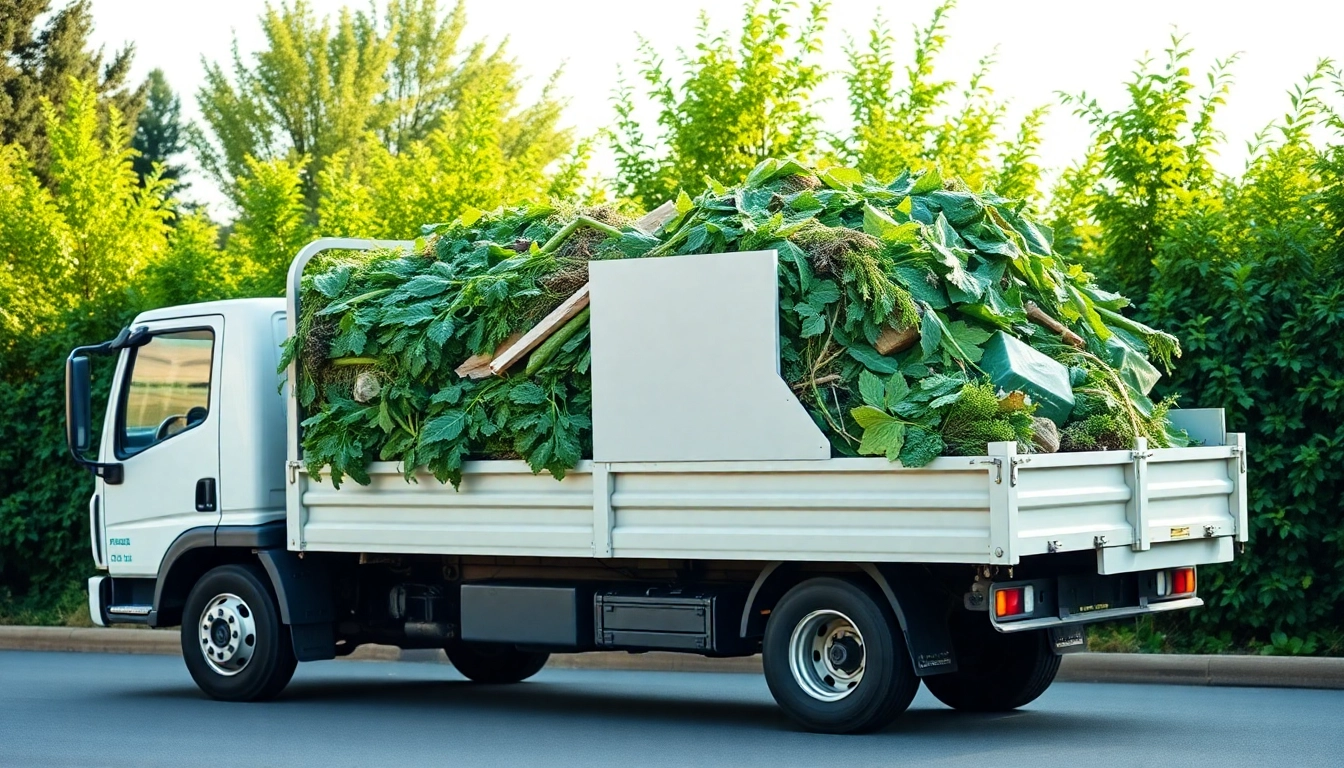Understanding Garden Waste Collection Services
What is a Garden Waste Collection Service?
A garden waste collection service is designed specifically to manage the disposal of organic waste that accumulates as part of gardening activities. These services typically operate on a scheduled basis, allowing residents to place specific types of waste at their curbsides for pickup. This organic waste may include grass clippings, leaves, branches, and other plant materials that are not suitable for regular trash collection.
In many areas, garden waste collection services are offered by local councils or private waste management companies. They often provide special bins or biodegradable bags to ensure that the waste is stored properly before collection. The goal is not only to efficiently remove waste but also to promote recycling and composting, ultimately supporting community sustainability efforts. By opting for a Garden Waste Collection Service, residents contribute to cleaner, greener neighborhoods.
Importance of Garden Waste Management
Garden waste management plays a crucial role in maintaining environmental health and community aesthetics. As gardening activities increase, so does the volume of organic waste produced. Proper management helps prevent problems associated with waste accumulation, such as pest infestations, odors, and unsightly streetscapes.
Furthermore, efficient garden waste management reduces the amount of organic material sent to landfills, where it decomposes and generates methane—a potent greenhouse gas. By diverting this waste towards composting or recycling initiatives, communities can significantly lower their carbon footprint and promote sustainable practices.
Types of Materials Collected
Garden waste collection services typically accept a wide range of organic materials. Commonly collected items include:
- Grass clippings
- Leaves
- Small branches and twigs
- Plant cuttings
- Weeds and other garden debris
However, it’s important to note that most services do not accept food waste, soil, or plastic bags. To educate residents, many providers include guidelines on what materials can be collected, ensuring compliance and reducing contamination in the recycling process.
Benefits of Choosing a Professional Collection Service
Convenience of Scheduled Collections
One of the primary advantages of a professional garden waste collection service is the convenience it offers. With scheduled pickups, homeowners can easily dispose of their organic waste without the hassle of transporting it to a landfill or recycling center themselves. This service frees up time and energy, allowing gardeners to focus on nurturing their plants rather than managing waste logistics.
Additionally, the fixed schedule ensures that waste is collected promptly, preventing overflow and maintaining cleanliness in the neighborhood. Many services also provide reminders leading up to collection days, further enhancing organizational efficiency for residents.
Impact on the Environment
Professional garden waste collection services significantly contribute to environmental sustainability. By handling organic waste appropriately, these services reduce the likelihood of illegal dumping and encourage responsible disposal methods.
Moreover, many providers process collected garden waste into compost or mulch. This transformation not only helps to enrich local soils but also reduces reliance on synthetic fertilizers and improves overall plant health. By embracing garden waste collection as part of a broader environmental strategy, communities can enhance local biodiversity and soil quality.
Cost-Effectiveness of Professional Services
While some residents may consider handling garden waste on their own to save money, professional services can often be more cost-effective in the long run. Factors such as fuel costs, time spent on transportation, and potential landfill fees can add up quickly. Additionally, professional services typically offer competitive pricing structures that cater to various household sizes and needs.
In many cases, engaging a garden waste collection service can prevent costly fines associated with illegal dumping or contamination of regular waste bins. These financial savings, combined with the environmental benefits, make professional collection services a sensible investment for responsible homeowners.
How to Prepare for Garden Waste Collection
Separating Organic Waste
Preparing for garden waste collection begins with understanding what constitutes organic waste. Homeowners should ensure that only acceptable materials are set out for collection. This may involve separating garden waste from other types of refuse, especially items that can contaminate the organic load, such as plastics or metals.
Using designated bins or bags for garden waste can help in this separation process. Clearly labeling the containers can also prevent mix-ups and instill good habits within households regarding waste sorting.
Recommended Collection Practices
To ensure a smooth collection process, residents should follow a few best practices when preparing their garden waste:
- Ensure that all items are securely contained within designated bags or bins to prevent spillage during collection.
- Place yard waste at the curb before the scheduled collection time, taking into account any guidelines provided by the collection service.
- Avoid overloading bins or bags; ensure they are easy for workers to lift and handle.
Helpful Tips for Preparation
Here are several practical tips to streamline the garden waste collection preparation process:
- Trim larger branches to fit neatly into collection containers.
- Mix shredded leaves with grass clippings, which can improve air circulation and decomposition rates.
- Stay informed about collection schedules, particularly during peak seasons like spring and fall, when foliage is abundant.
- Check with the local service provider for any changes or updates to collection practices.
Finding the Right Garden Waste Collection Service
Key Factors to Consider
When searching for a reliable garden waste collection service, there are several key factors to assess:
- Service Frequency: Determine whether the service offers weekly, biweekly, or monthly collections and choose one that aligns with your gardening habits.
- Types of Materials Accepted: Ensure that the service collects all the types of organic waste that you typically produce.
- Pricing: Compare pricing packages and understand what is included to avoid hidden fees.
- Customer Reviews: Seek feedback from other customers to gauge satisfaction and reliability.
Questions to Ask Your Provider
Before committing to a garden waste collection service, be sure to ask the following questions:
- What are the specific materials you do not accept?
- How do you handle collected materials? Are they composted or recycled?
- What is the protocol for missed collections?
- Do you provide bins or bags, or do I need to purchase my own?
Comparing Local Services
Once you have gathered a list of potential providers, compare their offerings side by side. Look for transparency in pricing, customer service availability, and additional benefits such as educational resources or community events on composting and sustainability. Additionally, consider the company’s reputation within the community; a company dedicated to environmental responsibility and transparency is often a better choice than one that prioritizes profit over service.
Maximizing Your Garden’s Sustainability
Composting and Recycling Options
In tandem with utilizing a garden waste collection service, homeowners can also engage in composting to further enhance sustainability. Composting is the process of breaking down organic matter into nutrient-rich soil amendments. This practice not only diverts waste from landfills but also provides gardeners with a valuable resource for enriching their soils.
Residents can set up backyard compost bins or utilize community composting programs if available. By understanding the composting process and what materials to include or exclude, gardeners can create their own high-quality compost while minimizing waste.
Integrating Collection Services with Sustainable Practices
Incorporating garden waste collection services into broader sustainable practices allows households to maximize their environmental impacts. For instance, pairing collection with rainwater harvesting can lead to resource conservation in watering gardens. Moreover, using the compost generated from waste collection aligns well with sustainable gardening efforts.
Implementing these practices can foster a culture of environmental stewardship within communities, inspiring others to adopt similar behaviors and furthering collective sustainability efforts.
Measuring the Impact on Your Community
To gauge the effectiveness of garden waste collection services and their impact on the community, it’s essential to measure several metrics:
- Reduction in Landfill Waste: Analyze trends in local landfill waste reduction directly attributed to composting efforts.
- Increased Participation Rates: Track community engagement with local waste collection programs and educational workshops.
- Soil Health Indicators: Assess improvements in local soil quality through community gardens or agricultural initiatives.
By measuring these elements, communities can better understand the positive implications of efficient waste collection and management, thereby justifying the continuation and expansion of these critical services.



